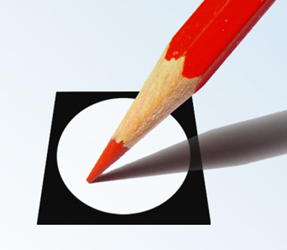voting advice?
10-04-2017 - Posted by Andre PietFor them who live in the Netherlands, it was impossible to ignore that March 15 was the date of parliamentary elections. For months the voters have been pointed to news about the many parties who ask our attention but especially our vote. Also several Christian parties like CDA, CU and SGP contribute in this. There is even an eccentric party called Jezus Leeft (Jesus lives). There are also Christians who cannot support Christian party-formation and give their vote to left wing parties (GroenLinks, SP, PvdA) and others feel attracted to a right wing party like VVD, or even choose for a controversial, nationalistic party (PVV). In short, Christians you just can find across the whole political spectrum.
apolitical
The GoedBericht-site is outside of all this. It is explicitly apolitical. Insofar Goedbericht.nl calls for voting, than it is a call of thanksgiving ‘for kings and all those being in a superior status’ (1 Timothy 2: 2). No matter what the election results would be, ‘for there is no authority except under GOD (Romans 13: 1). As subjects we should be submissive. Even if a government would ask us something, that we cannot respond to because of conscientious objections, even then it is and remains our superior. This attitude of submissiveness towards the government colours the atmosphere of all letters in the New Testament. But is that apolitical motive, used in the New Testament, also valid in our time? As citizens we are invited to participate in political elections, which were unknown in Biblical times? May we withdraw from it? As we are happy with our freedom, are not we obliged to use our democratic rights?
democracy and rule of law
In my view, in this reasoning two things are mixed up. It is a privilege to live in a free country. We can go where we want, and we have freedom of thinking and speaking. That freedom is enshrined in the constitution, which makes that we live in a rule of law: a government that is limited by an independent judiciary. That is contradiction to the concept of dictatorship, in which the power of the ruler is absolute. The concept of a rule of law is fully Biblical: ‘with right judgment and with justice’ (Isaiah 9: 7; Isaiah 32: 1). These are the frameworks in which would be governed. Does that mean: democracy? No, both logically and historically, those are two different matters. A rule of law is not necessarily a democracy and, vice versa, a democracy not a rule of law. A country can have an independent judiciary, without a government which is elected democratically. Until the 19th century The Netherlands were a rule of law, but not a democracy. Also, in theory, a democracy can exist that decides any dispute (for example by tele-voting) without rules, democratically. That would be a democracy, but not a rule of law.
top-down
In the western world we often consider the democratic form of state as a moral benchmark. Undemocratic is the same as objectionable. Keep in mind that the western democracy, only got shape in the last two centuries. Also the Bible does not know a democratic ideal. In fact, the entire concept is even unknown. In the Scripture authority is by definition given from above (compare John 19: 11). Top-down. Like authority operates in business or in the army. The major selects and directs the minor. In contrast, the concept of democracy is that power comes bottom-up: the people rule.
morally superior
It is, in my view, difficult to defend that a democratic rule of law is superior to a non-democratic rule of law. Are not often political elections a model of mendacity? Competitors are dismissed as negative as possible in favour of oneself. Prosperous futures are promised to voters, and everybody knows that after elections not many of the promises are kept. Elections usually do not provide the best leaders. Doesn’t politics have an image of unreliability also because of this reason? Making compromises is the nature of democracy. And that is subsequently a breeding ground for cynicism. By such sentiment (populism!) democracy can easily destroy itself. Remember that Adolf Hitler took a democratic route in the 30s of the last century.
Ineffective
In addition to the fact that democracy is a recognized ineffective system of decision making. Decisions are not only taken slowly, they are often a mix of opposing views, which does not make any of the parties happy. Everyone contributes, no one is confident. Another disadvantage of democracy is that everyone, skilled or not, has the same influence on the decision process. The expert does not have more authority than the layman. Is that fair? Yet another objection to democracy is that it does not have the ability to take necessary, unpopular measures in the short term. For such measures are going to be punished in future elections.
Conclusion
Do not misunderstand me: I do not place these objections against democracy with the intention to abolish it. Because that would still be a political endeavour. What I am saying is that we should be very grateful for the freedom and for the rule of law we live in, but we should not confuse it with democracy and elections.

 English Blog
English Blog